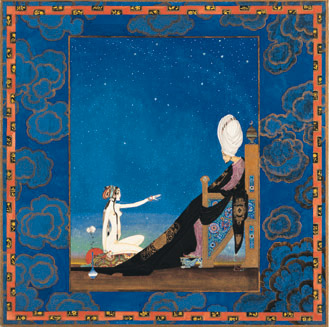 As a subject, the tales of 1001 nights, both as far as their content as what is their history concerned, are ideal for In Our Time. Not even a nervous guest such a Gerard van Gelder, Laudian Professor of Arabic at the University of Oxford, a Dutchman?, can ruin that. The tales are fantastic, their history is. And the way they are received by the west is filled with romanticism and fascination with the exotic orient.
As a subject, the tales of 1001 nights, both as far as their content as what is their history concerned, are ideal for In Our Time. Not even a nervous guest such a Gerard van Gelder, Laudian Professor of Arabic at the University of Oxford, a Dutchman?, can ruin that. The tales are fantastic, their history is. And the way they are received by the west is filled with romanticism and fascination with the exotic orient.It turns out, Arabic high culture is a bit less impressed. The tales are not of good language and considered to be mostly boorish and pulpish. What is more, is that it is anonymous - and that is not looked well upon. In spite of that all, the Arabian Nights is what entered into western culture out of the Arabic. And where did the Arabs get it from? An important question, as the Nights are a product of a lengthy tradtion.
IOT doesn't give a definitive answer, but what begins to emerge is a picture of constant cultural reception and exchange. How old Indian tales are received among the Persians, who give it its initial frame (with the princess Scheherazade) and then the tales of Baghdad. The earliest sources are already Arabian, from the early 9th century, but what makes it to Europe is the 15th century version which already received Turkish elements with gunpowder and coffee. The greatest irony is that because of the Western acclaim, the Nights are re-evaluated among Arabs. And so, out of a long tradition from east to west, the tales are now beginning to run eastwards back. And in any case are a wonderful witness to cultural diversity and exchange.
No comments:
Post a Comment